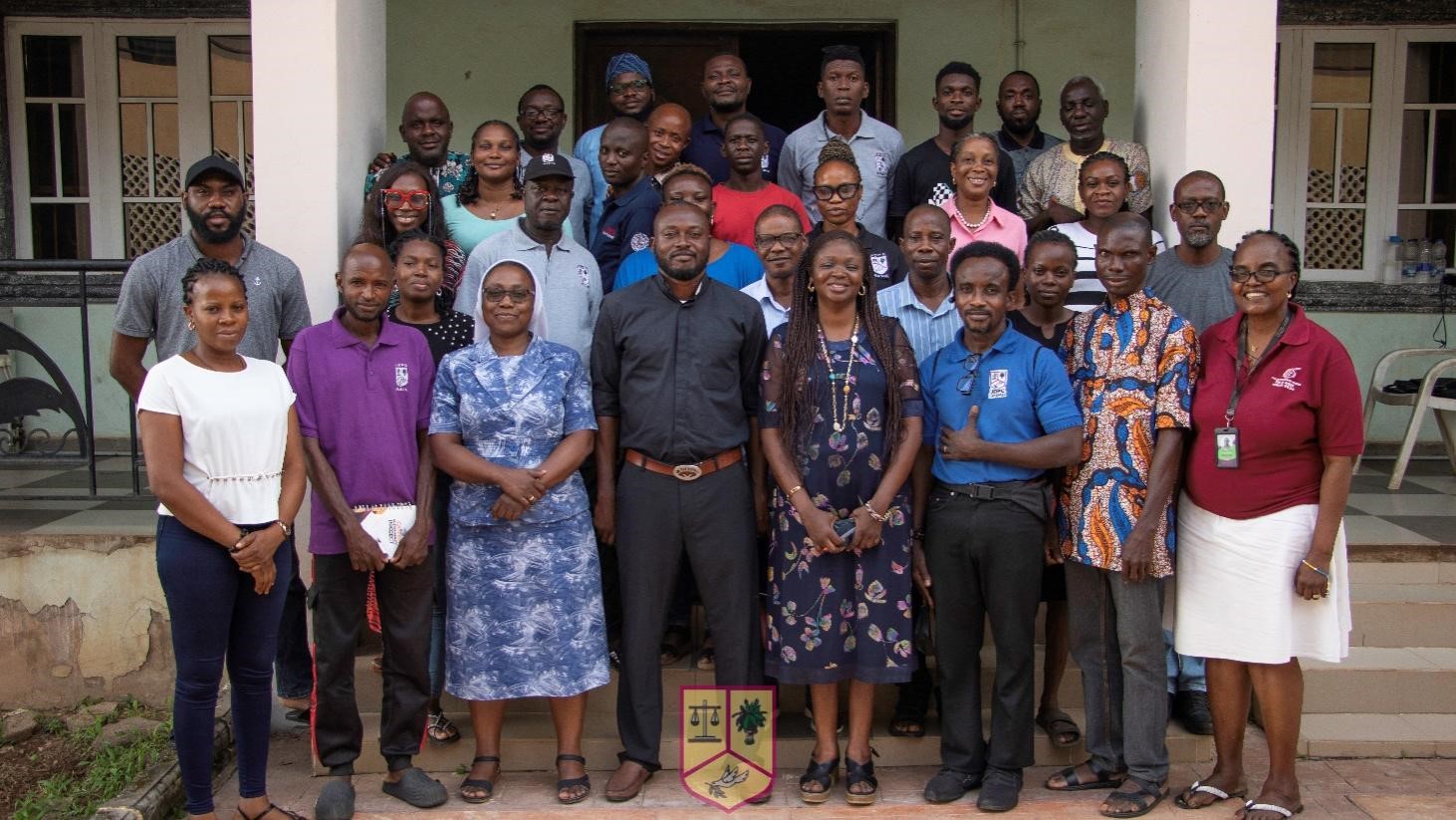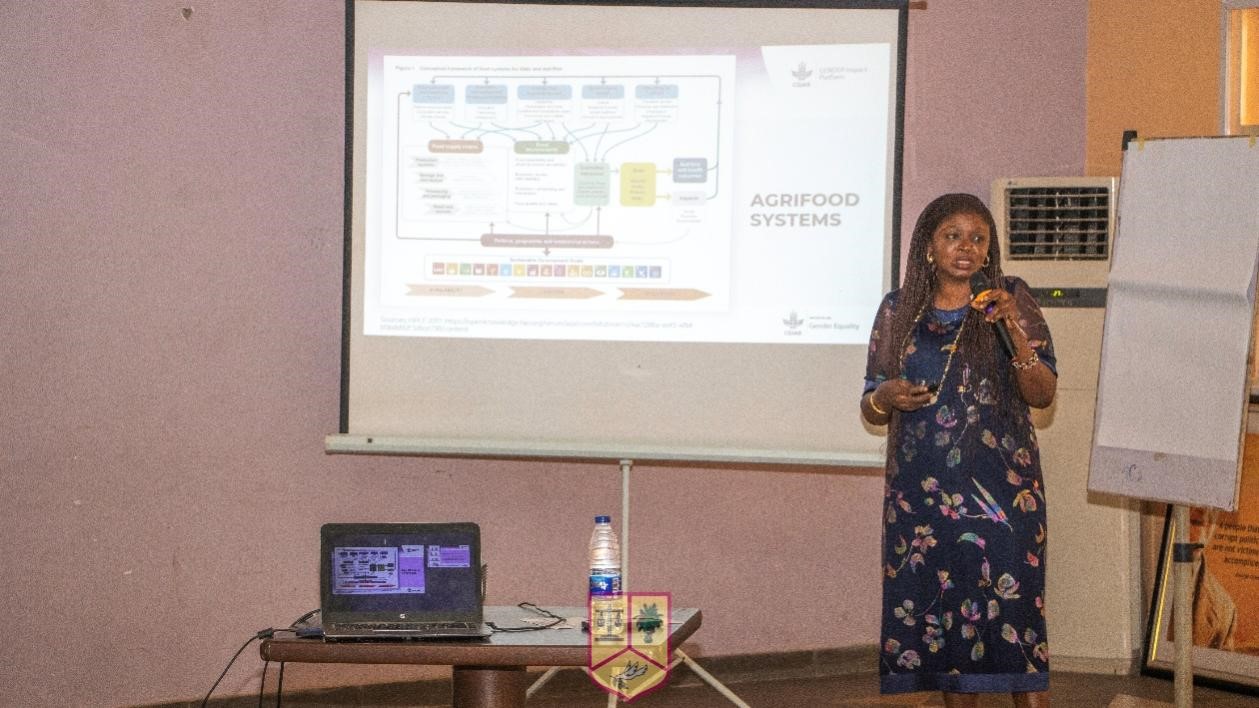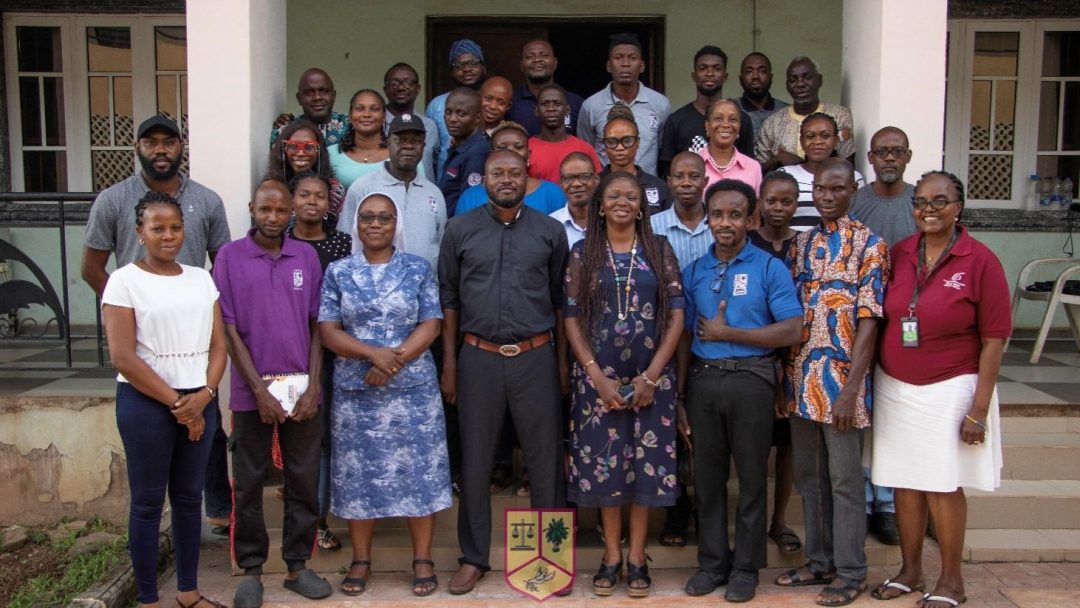In a bold move to address deep-rooted gender norms and foster inclusive development through staff capacity strengthening, the Gender Equality and Inclusion Accelerator conducted a pilot training on Gender Transformative Approaches (GTAs) in Agrifood Systems – a training course consisting of four modules – for staff members of the Justice Development and Peace Commission (JDPC), Ibadan. Held on May 7 and 8 at the JDPC Office Headquarters in Ibadan, the two-day training engaged 30 JDPC staff members, including program officers, volunteers, and management staff.
The training had two primary objectives: first, to pilot the new course and get feedback for improving it; and second, to improve participants’ understanding of various issues tied to GTAs and their implementation in agrifood systems. Through participatory methods like brainstorming, questions and answers, group exercises, and discussions, the training equipped participants with knowledge about gender inequalities in agrifood systems, gender integration approaches, operationalization of GTAs, and measuring gender transformative change.

Staff members and management of JDPC Ibadan with the training facilitator – Olajumoke Adeyeye (Postdoctoral Fellow, Gender Research, IITA Ibadan).
Photo credit: JDPC, Ibadan.
Day One – Value and Important Concepts of Gender Transformative Approaches
The first day of the training featured two main modules on the importance of gender and approaches to gender in agrifood systems and characteristics important to gender transformative approaches. These modules aimed to deepen participants’ understanding of GTAs’ value in agrifood systems and introduce the key concepts necessary for effective application. The modules covered topics such as gender in agrifood systems, core areas of gender equality, the gendered agrifood system framework, the continuum of gender approaches, key characteristics of GTAs, case studies, and ethical considerations for implementing gender transformative approaches.
Many participants highlighted how the modules exposed the persistence of power dynamics that reinforce gender inequality. A Program Officer at JDPC Ibadan mentioned that she was only aware of addressing gender inequalities through gender accommodating and gender responsive approaches. “Getting the opportunity to identify the value of gender transformative approaches to address underlying causes of gender inequalities would ultimately allow us to promote long-lasting changes through our agrifood systems interventions,” she affirmed.

The training facilitator, Olajumoke Adeyeye, explaining the concept of agrifood systems to the participants.
Photo credit: JDPC, Ibadan.
Day Two – Operationalizing Gender Transformative Approaches and Measuring Gender Transformative Change
The training featured two main modules on how to operationalize gender transformative approaches and measuring gender transformative change. These modules explored the design, implementation, monitoring, evaluation, and learning aspects of GTAs. Participants also examined measurement frameworks, processes, and real-world case studies involving gender transformative change indicators.
There was positive feedback from participants, particularly regarding the hands-on elements of the training, such as learning about the frameworks, different models of design, implementation, monitoring, and evaluation, and best practices from various case studies where GTAs had been applied. “Going through the participatory exercises and the practical case studies, which allowed me to see the insidious ways that gender biases can infiltrate our work, is a key takeaway for me today,” an administrative staff member confirmed. “Now, I know that we have to be intentional about unlearning the discriminatory and harmful norms,” another participant affirmed.

The training facilitator, Olajumoke Adeyeye, engaging the participants in an interactive session.
Photo credit: JDPC, Ibadan.
Strengthening Institutional Commitment to Transformative Change
For the staff and management of JDPC Ibadan, the training course marked a renewed institutional commitment to positioning gender equality across all its programming areas including agriculture, youth empowerment, justice reform, and social advocacy. According to the Director of JDPC Ibadan, the training was not only about gender and agrifood systems; it provided time for critical reflection and an opportunity that enabled everyone to look inward and consider how they can engage with people, programs, and policies to promote gender transformative change.
“We do not just want to be implementers; we are going to be change agents. The change will start from us, and this training has given us the capacity to be intentional about equality and inclusion, not just in theory, but in practice,” the Director said.
Conclusion – Personal and Organizational Pledges for Embracing Gender Transformative Principles
The session concluded with participants making personal and organizational pledges to apply gender-transformative principles in their work. A key commitment from the organization is to increase efforts towards advocating systemic reforms that would promote fairness, dignity, and opportunities for all people across different economic and social classes. “We will be intentional about challenging norms and shifting power dynamics that no longer benefit all and sundry. True transformation starts with self-knowledge and a desire to change systems that are biased and discriminatory,” a program officer proclaimed.
About the Gender Equality and Inclusion Accelerator
The GTAs in agrifood systems training course was developed by the CGIAR GENDER Impact Platform and the Gender Equality Initiative (now called the Gender Equality and Inclusion (GEI) Accelerator) to strengthen the capacities of development partners and researchers working towards the advancement of gender transformative change through their projects and interventions. The Justice, Development and Peace Commission (JDPC), Ibadan, is the key development partner in Nigeria collaborating with the GEI Accelerator in co-designing and implementing gender transformative interventions with members of cassava-based groups in three Local Government Areas (LGAs) in Oyo State–Ibarapa South, Ibarapa Central, and Ibarapa North.



No Comments